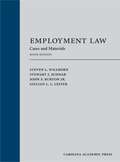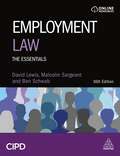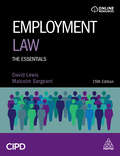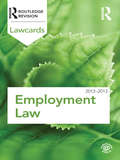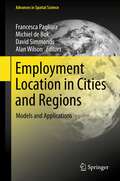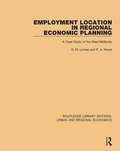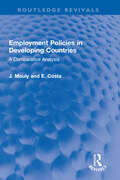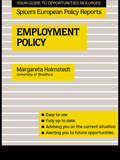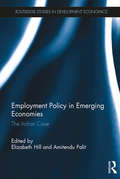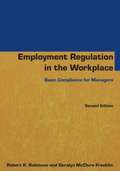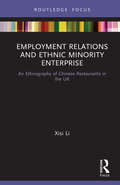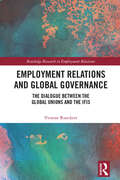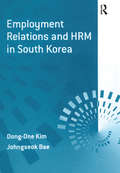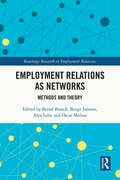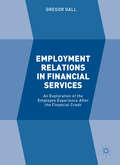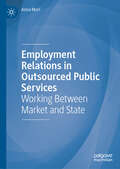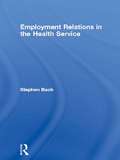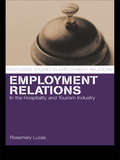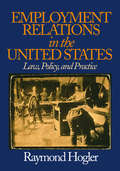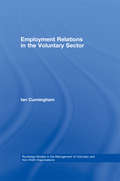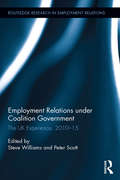- Table View
- List View
Employment Law: Cases And Materials
by John Burton Steven Willborn Stewart Schwab Gillian LesterThe Sixth Edition of Employment Law will continue the volume¿s focus on important unifying themes in employment law, such as the struggle for authority in the workplace between employers, employees, and the government, the relationship between employment law and labor markets, and the appropriate remedies for employment law violations.
Employment Law: Cases and Materials 2nd edition
by Steven L. Willborn Stewart J. Schwab John F. BurtonInformative overview of Employment Laws.
Employment Law: Eighth edition
by David Lewis Malcolm SargeantOffering comprehensive coverage of all the key aspects of individual and collective employment law in a clear and accessible way, Employment Law is ideal for both LLB and HRM students. Packed with a wealth of case law and legislation, this book will enable you to fully understand the intricacies of this fast-changing subject with ease. With features such as chapter summaries and further reading suggestions, Employment Law is well suited to support you in your studies. The eighth edition has been fully updated to include coverage of the latest legislative and case law developments, including: Issues around shared parental leave The national living wage Legal developments in the area of non-standard work
Employment Law: The Essentials
by Malcolm Sargeant Ben Schwab David Balaban LewisEmployment Law is the core textbook for the CIPD Level 7 module of the same name. Easy to read, jargon-free and full of case studies and useful examples this fully updated 16th edition provides a thorough grounding in UK employment law and how it applies in practice. This definitive guide covers everything students need know to excel at their studies and begin a successful career as an HR professional. It covers the formation of the Contract of Employment, recruitment and selection, parental rights, discrimination and health and safety in the workplace. There is also essential coverage of unfair dismissal and redundancy. This new edition is completely up to date with the latest cases and legislation including updates to discrimination law and working time. There is also guidance on the legal implications of Brexit such as freedom of movement, workers' rights and the change to procedural arrangements for the final court of appeal in UK cases. Reflective activities, case studies and explore further boxes encourage critical thinking, broader engagement with the topic and a clear understanding of how employment law applies in practice, Online resources include a lecturer guide, powerpoint slides and extra case studies to support learning and enable students to apply the theory in practice.
Employment Law: The Essentials
by Malcolm Sargeant David Balaban LewisEmployment Law is the core textbook for the CIPD Level 7 Employment Law module. It takes the reader step-by-step through everything that they need to know, including the formation of the Contract of Employment, discrimination, health and safety in the workplace, unfair dismissal and redundancy. Easy to read and navigate, and full of case studies and useful examples that encourage deeper thinking, this fully updated 15th edition provides a thorough theoretical grounding in employment law that can be applied in practice.This new edition of Employment Law is completely up to date with the latest cases and legislation, including zero hours contracts, migrant workers' rights, shared parental leave and Brexit and provides an up-to-date analysis of anti-discrimination law, the national living wage and the 'Transfer of Undertakings (Protection of Employment) Regulations 2006' (TUPE). Online resources include a lecturer guide, powerpoint slides, multiple choice questions and extra case studies to support learning and enable students to apply the theory in practice.
Employment Lawcards 2012-2013 (Lawcards)
by RoutledgeRoutledge Lawcards are your complete, pocket-sized guides to key examinable areas of the undergraduate law curriculum and the CPE/GDL. Their concise text, user-friendly layout and compact format make them an ideal revision aid. Helping you to identify, understand and commit to memory the salient points of each area of the law, shouldn’t you make Routledge Lawcards your essential revision companions? Fully updated and revised with all the most important recent legal developments, Routledge Lawcards are packed with features: Revision checklists help you to consolidate the key issues within each topic Colour coded highlighting really makes cases and legislation stand out Full tables of cases and legislation make for easy reference Boxed case notes pick out the cases that are most likely to come up in exams Diagrams and flowcharts clarify and condense complex and important topics '...an excellent starting point for any enthusiastic reviser. The books are concise and get right down to the nitty-gritty of each topic.' - Lex Magazine Routledge Lawcards are supported by a Companion Website offering: Flashcard glossaries allowing you to test your understanding of key terms and definitions Multiple Choice Questions to test and consolidate your revision of each chapter Advice and tips to help you better plan your revision and prepare for your exams Titles in the Series: Commercial Law; Company Law; Constitutional Law; Contract Law; Criminal Law; Employment Law; English Legal System; European Union Law; Evidence; Family Law; Human Rights; Intellectual Property Law; Jurisprudence; Land Law; Trusts Law
Employment Location in Cities and Regions
by Alan Wilson David Simmonds Francesca Pagliara Michiel De BokThe focus of this book is the modeling of the location of economic activities, measured in terms of employment, in land-use and transportation systems. These measures are key inputs to models at intra-urban scales of the flows of persons and goods for both urban and transport planning. The models described here are either components of comprehensive models or specialist studies. Economic activities can be defined in terms of jobs or private-sector firms and public service organisations. Different levels of aggregation are used both in terms of organisational and geographical dimensions. In the case of firms and public organizations, a distinction can be made between the organizations themselves and corresponding establishments. For urban simulation models, it is the location of establishments that is important. At the more coarse levels of aggregation that are usually used in comprehensive models, firms and organizations are aggregated into sectors.
Employment Location in Regional Economic Planning: A Case Study of the West Midlands (Routledge Library Editions: Urban and Regional Economics)
by G. M. Lomas P. A. WoodOriginally published in 1970. During the times of planned population movements and new towns, with a growing interest in specifically regional policies by government, this book considers the problems of development within regions. It presents research on the facts and trends of employment generated by the regional economy and its relationship with the size and socio-economic character of local workforce, using the example of the West Midlands as testing ground for policy. The authors come from the viewpoint of needing to develop understanding of population, housing, employment and communications – the way our regional economy and society worked, before organised de-centralisation could be planned appropriately. Within the field of economic planning they ask what analysis of the information available tell us about development possibilities within a region. The book looks at trends in employment growth, the character and distribution of manufacturing industries and service industries and the locational consequences, to build a picture of the regional economic system. It then considers supply and demand and measures the ways towns vary in detailed case studies.
Employment Policies in Developing Countries: A Comparative Analysis (Routledge Revivals)
by E. Costa J. MoulyFirst published in 1974, Employment Policies in Developing Countries is an attempt to take stock of experience that has been acquired in a number of developing countries in matters relating to employment promotion. It begins with a discussion of the nature of the employment objective, its role in the development process and with some attempt to quantify the dimensions of the problem. In Part Two employment promotion measures are examined in relation to each of the major economic sectors, while Part Three is concerned with vocational training, migration, and demographic policies. Finally, some suggestions are made as to how developing countries might define employment goals and formulate programmes for their attainment. This book is a must read for scholars and researchers of economics, labour economics and public policy.
Employment Policy (Spicers European Policy Reports)
by Margareta HolmstedtThe nature and structure of work is changing across Europe with new working patterns, flexible working practices, and demands for new unemployment rights. Moreover, the move towards establishing a Single European Market from 1992 onwards involves the creation of a new legal framework for employment rights and practices. This volume explains what EC legislation means in this sphere, and outlines what is likely to happen as part of the `1992' programme. Employers - big and small - employees and trade unions alike will find this volume an invaluable guide and a single source of reference. It will also be of interest to those in public administration and social organisations concerned with employment rights and practices. A single European market raises many issues for how and when we work, what rights we have, and what we can ask for. Employment policy within the EC is thus set to undergo important changes and most of us will need to be aware of them.
Employment Policy in Emerging Economies: The Indian Case (Routledge Studies in Development Economics)
by Elizabeth Hill Amitendu PalitEmployment is a critical part of the macro-economy and a key driver of economic development. India’s employment policy over the past three decades provides an important case study for understanding how government attitudes to the labour market contribute to an emerging economy’s growth and development. This study contains important insights on the policy challenges faced by one of the world’s most populous, labour abundant economies in securing employment in a context of structural change. The book considers India’s approach to employment policy from a national and global perspective and whether policy settings promote employment intensive growth. Chapters in the first half of the volume evaluate India’s approach to employment policy within the national and international context. This includes the ILO Decent Work program, the national agenda for inclusive growth, and national regulatory frameworks for labour and education. Chapters in the second half of the volume focus on how employment policy works in practice and its impact on manufacturing workers, the self-employed, women, and rural workers. These chapters draw attention to the contradictions within the current policy regime and the need for new approaches. Employment Policy in Emerging Economies will interest scholars, policy makers and students of the Indian economy and South Asia more generally. It will support undergraduate and postgraduate academic teaching in courses on economic development, global political economy, the Indian economy and global labour.
Employment Regulation In The Workplace: Basic Compliance For Managers (Second Edition)
by Geralyn McClure Franklin Robert K. RobinsonHuman resource compliance in today's increasingly complex legal environment has become a critical component of all HR activities. This text will acquaint readers with the major federal statutes and regulations that control management and employment practices in the American workplace. It is designed as a tool for management and business professionals, and the material is presented from a pro-business perspective of protecting the employer's interests and reducing exposure to litigation through monitoring activities and viable employee policies. "Employment Regulation in the Workplace" includes many features that make it an effective learning tool. Each chapter opens with learning objectives and an example scenario, and contains numerous figures, boxes, and diagrams. Chapters conclude with listings of key terms, questions for discussion, and case exercises. The book also includes a comprehensive bibliography. It can be used for a wide variety of courses in Employee Relations and Employment Law at both the graduate and undergraduate levels. An online Instructor's Manual with test questions, chapter outlines, case notes, PPT presentations, and more is available to adopters.
Employment Relations In South Korea
by Kiu Sik BaeEmployment Relations in South Korea provides readers with an overarching view of Korean employment relations and insight into recent changes; it also contributes to the general understanding of various phenomena and changes in Korean employment relations. To this end, contributors focus on presenting their findings in a manner that is easily accessible whilst offering in-depth quantitative analyses on specific topics or issues within the realm of employment relations. This book seeks to depict accurately and to understand the big picture of employment relations and the nature and characteristics of these relations. In doing so, this volume employs a multidisciplinary approach to examine employment relations from multiple dimensions through various methods.
Employment Relations and Ethnic Minority Enterprise: An Ethnography of Chinese Restaurants in the UK (Routledge Focus on Business and Management)
by Xisi LiThis book is the first piece of extensive research in studying employment relations in ethnic Chinese small businesses in Britain. It contributes to existing knowledge in three respects. Empirically, it examines the nature of employment relations in the ethnic Chinese restaurant sector in the UK context, a hitherto under-explored area. The study adds new knowledge to the study of employment relations in ethnic minority small firms. Theoretically, it draws out the concept of ‘ethnic twist’, which denotes how the conflict between different group members from the same ethnicity shapes patterns of shop floor behaviours, revealing the heterogeneity of people from the same ethnic origins. Methodologically, the research demonstrates the continued importance of the ethnographic approach in studying workplace relations. Additionally, we see lots of literature discussing overseas Chinese businesses in terms of cultural resources, business development, level of integration and structural constraints. Surprisingly little is published on interpretations of small firm workplace relations. This book might illuminate future studies to explore management practices and employment relationships in ethnic Chinese small businesses in different national environments and industry sectors. It will be of interest to researchers, academics and students in the fields of employment relations, human resource management and organisational behavior.
Employment Relations and Global Governance: The Dialogue between the Global Unions and the IFIs (Routledge Research in Employment Relations)
by Yvonne RueckertGlobalisation has created many opportunities for economic development, but it is also associated with rising income inequality and poverty. International crises such as the international financial and economic crisis of 2008, and more recently the global health pandemic, have led to a rise in unemployment and income losses for workers and a surge in the violation of workers’ rights. At global level intergovernmental organisations including the World Bank and the IMF are influential actors and policy makers which promote the UN Sustainable Development Goals. However, the International Financial Institutions (IFIs) have been criticised for their internal political power imbalances and macroeconomic policy prescriptions based on neo-liberal principles. The Global Unions and their affiliates as well as the International Labour Organisation (ILO) regularly comment on the negative impact of the IFI’s policies in regard to labour flexibilisation and the privatisation of public and social services. In 2002 a formalised dialogue was established between the Global Unions and the IFIs which addresses labour, social and environmental issues. This dialogue takes place at three levels: the country level, the sector level, and the headquarters level. The ILO maintains its own dialogue with the IFIs, but it also participates at the headquarters-level dialogue between the Global Unions and the IFIs. Employment Relations and Global Governance focuses on the headquarters-level dialogue which can be considered as a strategic instrument that helps the Global Unions and their affiliates to exercise influence over the policies of the IFIs, especially those policies which concern workers. The book describes and analyses the development of the dialogue since its establishment with a particular focus on factors which promote and hinder the dialogue. The book provides important insights into the real-world functioning of the institutions of economic global governance and its broader impact on the world of work. It is likely to be key reading for academics, researchers and students studying global employment relations, political economy, and international organisations. It will also be of interest to international and national trade unions, non-governmental organisations, and policy makers.
Employment Relations and HRM in South Korea
by Dong-One Kim Johngseok BaeSouth Korea is one of the rare countries that has experienced political/industrial democratization and economic development simultaneously in a relatively short period. However, the full story of democratization and development processes displays two faces - positive and negative aspects to the deployment of labour/human resources. This book explains these seemingly contradictory outcomes of Korean employment relations (ER) and human resource management (HRM) based upon a theoretical framework that incorporates logics of environmental constraints and strategies of actors. During three key periods of the previous century (i.e., pre-1987, 1987 - 1997 and post-1997), the book discusses the paradigm shift in both ER and HRM. This much-needed text contains informative details on Korean ER and HRM of past and present, with theoretical and practical views, and of transformations and continuities. The book provides policy implications that will stimulate constructive debates regarding the mutual-gains strategies for policy makers, management and employees.
Employment Relations as Networks: Methods and Theory (Routledge Research in Employment Relations)
by Bernd BrandlTraditional approaches in the wide field of employment relations focused on a small and clearly delineated set of actors, such as trade unions and employers’ organizations, operating within the constraints given by formal, nationally confined institutions. It is becoming increasingly clear that traditional approaches are insufficiently able to account for employment relations processes and outcomes in a world wherein formal institutions are being rapidly transformed and partially dissolved, national boundaries become porous, and the sheer number of actors involved is increasing substantially. A shift in perspective is necessary, past the nationally bounded actor-institution dichotomy, towards an understanding of employment relations as fundamentally mediated by complex and emergent networks that connect a multitude of actors within and between countries. ? This volume provides a seminal starting point for such a paradigm shift by applying theories and methodologies from social network analysis to the study of employment relations. It develops a theoretical toolkit of mechanisms that operate within networks and shape employment relations processes and outcomes, such as wages, labour market policies and labour conflicts. It brings together insights from various projects that investigate the structure, functioning and impact of networks in employment relations through quantitative and qualitative methods. It will be of particular interest to students and scholars of employment relations across business and management, economics, political science, and sociology disciplines, as well as those interested in social networks. Managers, trade unions, employers’ organizations and state authorities at national and international levels will find it helpful in understanding how networks shape their world.
Employment Relations in Financial Services
by Gregor GallThis book describes and analyses the impact of the 2007-2008 financial crisis upon the working conditions of employees in the financial services sector in Britain. It tells the story of workers being made to pay the price for a crisis that was not of their own making, but nevertheless caused a deleterious impact on their employment security, remuneration and working conditions. Evidence of fighting back against this has been sparse so that the response of employees is best characterised as 'fright' (grudgingly working harder and longer), 'flight' (leaving the sector through redundancy), and 'falling in line' (accepting the diktat of performance managements systems). Through this book we learn the reasons behind this acquiescence, with its detailed attention to topics such as the stunted development of labour unionism, the prevalence of union-management partnerships, and the occurrence of employment insecurity and labour shedding. Providing a valuable insight into the effects of the financial crash, Employment Relations in Financial Services will be useful to academics, students and also trade unionists.
Employment Relations in Non-Union Firms (Routledge Research In Employment Relations Ser. #Vol. 12)
by Tony Dundon Derek RollinsonThe precise relationship between an employee and employer is often ambiguous within complex organizational boundaries. This book re-evaluates the way employment relations are conceptualized and examines employment conditions in non-union organizations.The authors present a detailed analysis of the conditions and patterns of employment relations in
Employment Relations in Outsourced Public Services: Working Between Market and State
by Anna MoriExamining the consequences of the outsourcing of public services, this book explores the transformation of working conditions, employment relations and the role of the state under marketisation strain. It places these developments in a wider framework that incorporates the legacy of the national models of public administration and employment relations regimes in the public sector. Adopting a comparative perspective by focusing on Italy, Denmark and Britain, the author investigates and questions the influential interpretation of a spreading neo-liberal trajectory in public service working conditions and employment relations, and reveals significant diversity across countries mediated by national institutional configurations. Discussing the interplay between the austerity agenda in the aftermath of the financial crisis and the swelling of outsourcing practices in public services, this book responds to the scholarly call for an integrated approach towards institutions and actors. A valuable read for researchers examining human resource management, labour studies and public administration, this book provides a comprehensive overview of employment relations in outsourced public services.
Employment Relations in the Health Service: The Management Of Reforms (Routledge Studies in Employment and Work Relations in Context #1)
by Stephen BachEmployment relations within the health sector have undergone radical reform over recent years. This book is an important new study that examines the responses of managers and workers to these different reforms, at both national and local level. Bringing together analyses of both employment relations and public sector management, the book focuses on understanding why certain initiatives have been adopted, how managers have responded to them and the consequences of the HR modernisation agenda. Topics covered include: HR strategy and structure at the workplace employee involvement and union influence pay modernisation management of work. Featuring detailed case study research in three NHS trusts, the book illustrates precisely how government policies are implemented in the workplace and in doing so offers a unique insight into the sector's changing work environment. A comprehensive study of atopical area, this book will be of interest to students and academics in health service management, human resource management and employment relations.
Employment Relations in the Hospitality and Tourism Industries (Routledge Studies In Employment Relations Ser.)
by Rosemary LucasUniquely combining employment relations and the hospitality and tourism fields, this book draws on recently published sources to give readers a comprehensive and internationally comparative perspective on the subject area. It boldly extends the traditional analysis of employment relations by integrating new topics such as the role of customers and
Employment Relations in the United States: Law, Policy, and Practice
by Dr Raymond L. HoglerEmployment is closely connected to wealth, status, and security and is therefore a subject of interest across a range of academic disciplines. Employment Relations in the United States incorporates a wealth of research material from these different specialties to provide a historical perspective on the American workplace and the evolution of legal policies affecting employment. The analysis follows both a chronological and thematic arrangement, beginning with the importance of management practices, the growth of labor organizations and the impact of collective bargaining on employment institutions, and the subsequent rise of individual employment rights enforced through administrative and judicial means. Through its evolutionary approach, the book explains the fragmented, overlapping, and conceptually confusing regulatory environment governing workplace relations. It offers an integrated approach to such important contemporary policy issues as health care coverage, pensions, and effective dispute procedures. The book provides an analytical framework for an understanding of the unique nature of our labor markets and the role of government, employers, and unions. Key Features Provides students with the historical background they need to understand how the U.S. system developed and how it differs from systems in other industrialized nations Discusses individual employment rights, including protection from discrimination Covers current policy issues in employment, including raising the minimum wage, the growth of a contingent workforce, and privatizing retirement Offers a unique historical and evolutionary explanation of the nature of employment relations As a general overview of contemporary employment relations, Employment Relations in the United States is a perfect supplement to college courses in employment law, human resource management, and collective bargaining. Human resource managers, mediators, and professionals involved in labor relations will also find this an essential reference.
Employment Relations in the Voluntary Sector: Struggling to Care (Routledge Studies In The Management Of Voluntary And Non-profit Organizations Ser. #10)
by Ian CunninghamThis new book addresses the topical issues surrounding employment relations in UK voluntary organizations that operate within the quasi-market of social care. Combining an analysis of the established literature with in-depth qualitative field work, Ian Cunningham explores the nature of power relations between state and voluntary sector; implications of employment policy and subsequent pressures for change in pay and working conditions; the influence of trade unions in the sector; management’s capacity to resist external pressure and employee responses to this environment. Cunningham’s focus on the employment relationship in this sector is unique, highlighting a complex and variable pattern of interdependence and subordination between government agencies and voluntary sector employers. The author examines the way in which financial pressures from the state coupled with weak unionization diminish working conditions, arguing that employee morale will not be sustained if the voluntary sector fails to maintain its autonomy and minimize its dependency on state funding.
Employment Relations under Coalition Government: The UK Experience, 2010-2015 (Routledge Research in Employment Relations #37)
by Peter Scott Steve WilliamsDrawing on a wide range of up-to-date research, Employment Relations under Coalition Government critically examines developments in UK employment relations during the period of Conservative-Liberal Democrat government between 2010 and 2015, against the background of the 2007-08 financial crisis, subsequent economic recession and in the context of the primacy accorded to neo-liberal austerity. Contributions cover a series of important and relevant topics in a rigorous, yet accessible manner: labour market change and the rise of zero-hours contracts and other forms of precarious employment; policy development relating to young people’s employment; the coalition’s welfare-to-work agenda; its programme of employment law reform and its approach to workplace equality and health and safety; labour migration; the experience of the trade unions under the coalition and their responses; and developments in employment relations in the public services. This book addresses the broader issues relating to the coalition period, such as the implications of political and regulatory change for employment relations, including the greater devolution of powers to Scotland and Wales, and locates UK developments in comparative perspective. The book concludes with an assessment of the prospects for employment relations in the aftermath of the May 2015 Conservatives election victory.
